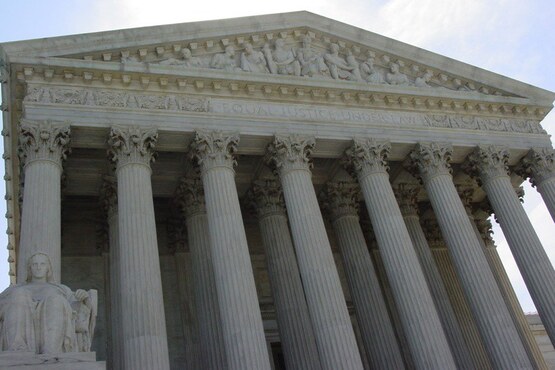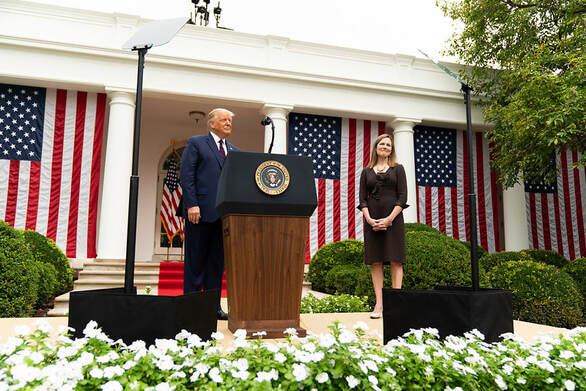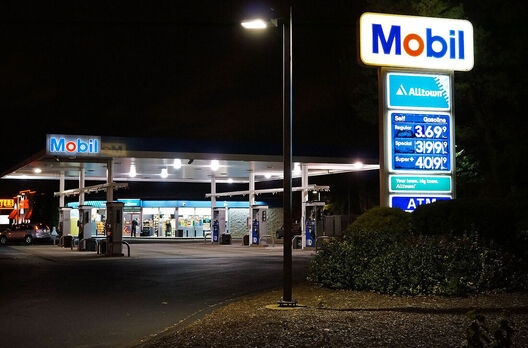|
A lawsuit brought by the City of Baltimore against nearly two dozen fossil fuel companies seeking to hold them accountable for climate harms stemming from their products reached the Supreme Court bench this week. Although the Court was not hearing the case on its merits or substance, the Justices appeared somewhat skeptical of the procedural arguments offered by the fossil fuel defense.
In oral arguments Tuesday, Jan. 19 in the case BP et al. v. Mayor and City Council of Baltimore, the Supreme Court focused discussion on the highly technical procedural question before it. This question - regarding the scope of appellate review of orders remanding (or sending back) cases from federal to state courts - has important implications for U.S. litigation targeting fossil fuel producers for alleged campaigns of climate denial and deception. In a strategic move to evade accountability, lawyers representing fossil fuel companies are trying to push climate accountability lawsuits, like the one filed by Baltimore, from state to federal courts where the cases are more likely to be dismissed. At the companies’ request, the Supreme Court is reviewing a decision issued by the Fourth Circuit Court of Appeals last year in Baltimore’s case sending that lawsuit back to state court. During Tuesday’s hearing, the Supreme Court Justices raised several questions or concerns with the position presented by counsel for the fossil fuel companies. Specifically at issue is the interpretation of a statutory provision (28 USC §1447d) governing appellate review of remand orders – which are orders sending cases back to state courts. Fossil fuel industry lawyers (Petitioners in this case) argue for a broader interpretation allowing review of the entire remand order on appeal, including multiple grounds for federal jurisdiction beyond the specific grounds (civil rights & federal officer) referenced in the statute. Almost all federal circuit courts that have ruled on this question do not support this interpretation. Concerns raised by the Justices during questioning of counsel for fossil fuel companies, Mr. Kannon Shanmugam, boil down to three main points:
While these issues are highly technical around statutory interpretation and rules of federal civil procedure, they have broader significance for climate accountability litigation against the fossil fuel industry. Should the Supreme Court side with the industry in this matter, it would effectively delay Baltimore’s case and similar climate accountability lawsuits from advancing in state courts, by reopening the federal appellate process to consider industry’s other arguments for federal jurisdiction. But the industry and its allies have urged the Supreme Court to go a step further and find that climate-related lawsuits must arise under federal [common] law, period. Industry lawyers have argued that, under Supreme Court precedent established by AEP v Connecticut, the Clean Air Act prevents or displaces legal claims brought under federal law relating to interstate greenhouse gas emissions, and thus see establishing federal jurisdiction as key to barring such claims altogether. Subsequent precedent set in Utility Air Group v EPA makes clear that the CAA did not address all sources of greenhouse gases, leaving open the possibility that federal common law climate claims may remain viable against sources of greenhouse not regulated by the Act. Justice Amy Coney Barrett seemed hesitant that the Court should go this far, suggesting in questioning fossil fuel industry counsel Mr. Shanmugam that “it would be fairly aggressive for us to resolve the federal common law question here.” This did not deter the fossil fuel counsel from pressing this point about federal law, however. As Mr. Shanmugam argued on Tuesday: “This Court’s precedents dictate the common sense conclusion that federal law governs claims alleging injury caused by worldwide GHG emissions.” The problem with this argument is that it mischaracterizes the actual claims asserted by Baltimore and other municipalities and states suing the fossil fuel industry over localized climate impacts. These impacts are exacerbated, plaintiffs say, by a decades-long campaign orchestrated by fossil fuel producers to downplay the dangers of their products. The tort or wrongdoing, as attorney Vic Sher, representing Baltimore, pointed out on Tuesday, is “fraud, deception, denial, and disinformation.” Traditionally such conduct falls under the province of state law. A representative from the City of Baltimore’s law department referenced this deceptive conduct in a statement responding to the Supreme Court hearing. “It is time for the case to start moving,” said Sara Gross, Chief of Affirmative Litigation Division in the Baltimore City Department of Law. “In the two and half years since we filed this case in Maryland state court, defendants have done everything they can to delay and avoid accountability for their decades of deception about climate change while Baltimore continues to suffer the costs and consequences of their actions.”
0 Comments
Supreme Court Showdown in Baltimore Climate Case: Why Trump's Influence Will Be on Display1/18/2021 The U.S. Supreme Court is scheduled to hear oral arguments tomorrow, January 19, in a lawsuit brought by the City of Baltimore against nearly two dozen fossil fuel companies seeking to hold them accountable for alleged deception regarding the climate damages of their products. But the hearing will not focus on the actual allegations or merits of the case; indeed, the companies are hoping the nation’s highest federal court will help them shut the door on this case and related litigation brought by state and local governments facing costly impacts stemming from the climate crisis like worsening floods, catastrophic storms, and deadly heat.
Baltimore – a coastal city with 60 miles of waterfront land threatened by rising seas – sued major energy companies like BP, Chevron, Shell and ExxonMobil in 2018 claiming that these companies’ deceptive business conduct obscured the dangers of fossil fuels and resulted in the dangerous climate consequences unfolding today. Baltimore is demanding the fossil fuel companies help pay for costs of adapting to climate impacts. The city brought its lawsuit under legal claims of nuisance, trespass, failure to warn, and violation of Maryland’s Consumer Protection Act – all state law claims. The companies, however, say the lawsuit must arise under federal law and have waged a procedural battle trying to challenge the venue, with the aim to have a court decide the case belongs in federal, not state, court because that is where the cases are more likely to be dismissed. It is a strategy they have employed in all other climate accountability cases brought against them. And it initially worked, with two federal district judges tossing out cases brought by New York City and by San Francisco and Oakland (though the NYC case was initially filed in federal court). Despite these initial wins for the oil companies, a handful of other federal judges have come to the opposite conclusion, deciding these kinds of climate cases about corporate deception belong in state courts. The companies challenged these rulings, and four federal appeals courts (the First Circuit, the Fourth Circuit, the Ninth Circuit and the Tenth Circuit) all rejected the companies’ appeals last year. The Fourth Circuit made its ruling last March in Baltimore’s case, and that is the ruling that the Supreme Court is taking up on a final appeal. Recently the oil industry lawyers lodged petitions requesting that the Supreme Court reverse the rulings from the three other appeals courts as well, but those petitions are on hold pending the Court’s decision in the Baltimore case. The hearing will start at 11am ET on January 19, 2021 and is available to stream via C-Span.org. More below on what is at stake, who the players are on the industry side and what they want, and why there is concern about one Supreme Court justice refusing to recuse from the case. At Stake: The Direction of Climate Litigation Targeting Big Oil The case before the Justices is strictly about procedure, not the substance of the litigation. A ruling in favor of the oil companies would give them the chance to return to the federal appeals court – in this case the Fourth Circuit – to make a host of other arguments for why the case should be transferred to federal courts and ultimately dismissed. That would effectively delay justice for the government plaintiffs by stalling the litigation from proceeding in state court until the appeal is finally resolved. There is a slight chance the Supreme Court could go even further and rule, as the oil companies have urged, that the Baltimore case and others like it belong in federal courts, period. This would land a possibly fatal blow to climate accountability lawsuits altogether – the ultimate goal of the lawyers representing the fossil fuel defendants. Basically at stake is the issue of jurisdiction – whether Baltimore’s case and others like it belong in state courts, as multiple appeals courts have now ruled, or whether they must proceed in federal courts where they are likely to be dismissed. The technical question before the Supreme Court is a bit more nuanced and complex, but ultimately the battle at this point is over procedure and the direction or path ahead for climate accountability lawsuits. As for the other pending petitions to the Supreme Court in similar climate lawsuits, the Court’s decision in Baltimore’s case would likely determine what happens with these cases. Currently the fossil fuel companies are challenging appellate rulings in cases brought by communities in Colorado and in California (Oakland/San Francisco plus a handful of municipalities led by San Mateo County), and by the state of Rhode Island. The challenge is the exact same as their petition in the Baltimore case. As Vermont Law School law professor Patrick Parenteau explained: “Normally the Court considers each petition separately in the order they are filed but given that all of them share a common issue (scope of appeal of remand) it is likely that whatever decision is reached in Baltimore will apply to the others.” Who is Backing Big Oil in this Battle, and What Do They Want? Notably, the hearing will feature not only arguments from the industry lawyers, but also from the Acting Solicitor General of the United States. On the last day of the Trump administration, the outgoing president’s Justice Department will be in court helping to bolster the appeal made by the oil companies. Jeffrey B. Wall as Acting Solicitor General will have 10 minutes to argue in support of companies like Chevron and ExxonMobil. Other friends or amici who filed briefs supporting Big Oil in this case include commercial trade associations like the American Petroleum Institute and National Association of Manufacturers, the U.S. Chamber of Commerce, conservative legal groups like Atlantic Legal Foundation and Washington Legal Foundation, a shady initiative helmed by lawyers tied to the coal industry called Energy Policy Advocates, a few retired military officers, a group called DRI - Voice of the Defense Bar, and a coalition of politically conservative states led by Indiana. These backers of Big Oil ultimately want the companies whose products cause climate damages to evade any accountability whatsoever, and they are counting on the Supreme Court to help them with a decision that would delay or derail this litigation. “Big Oil and their allies are asking the justices to bypass the narrow issue before them and instead issue a sweeping decision that would send all related climate damages cases to federal court. Since the oil defendants have repeatedly failed to win that argument in lower courts, this really feels like a Hail Mary pass to escape accountability,” Alyssa Johl, legal director with the Center for Climate Integrity, an initiative that supports holding polluters accountable for climate harms, previously said in a statement to DeSmog. Justice Barrett Has Family Ties to Shell – and Won’t Recuse Trump’s newest appointed Supreme Court Justice, Amy Coney Barrett, raised alarm among climate scientists, climate journalists and climate advocates during her Senate confirmation hearing in October when she refused to answer basic questions about her understanding of climate science, claiming the issue is a matter of “debate.” This debate over the science is part of the campaign of disinformation created by fossil fuel companies – and this campaign is at the heart of the climate lawsuits like the one brought by Baltimore. Justice Barrett will be on the bench presiding over Baltimore’s case, but questions have arisen over whether she should participate in this case given that her father worked for Shell Oil as attorney for many years. Shell is one of the defendants in this case, and Barrett has a personal family connection to the company. Justice Samuel Alito has already recused himself given he owns stock in some of the oil companies. And Justice Barrett had previously recused herself from cases involving Shell when she was a judge on the Seventh Circuit. But curiously she has not done so for the Baltimore case. Some leading environmental groups have called on Justice Barrett to sit the case out, noting her clear conflict-of-interest. “It’s well known that Justice Barrett’s father worked for decades as an attorney at Shell Oil, a named defendant in the case. He also played an active role in the American Petroleum Institute, the industry’s main U.S. lobby group, which is funded by numerous defendants in the Baltimore suit and has submitted an amicus curiae brief in support of their petition to the Supreme Court. These deep and long-standing conflicts of interest have led Justice Barrett to recuse herself from cases regarding Shell in the past,” said Kathy Mulvey, accountability campaign director in the Climate and Energy Program at Union of Concerned Scientists. “Given her father’s long-term work for Shell and the American Petroleum Institute, Justice Barrett should recuse herself from this case and all future cases involving the oil industry,” added Kassie Siegel, director of the Climate Law Institute at the Center for Biological Diversity. Although President-elect Joe Biden will be sworn in the following day, President Trump’s influence will be on display Tuesday with his Justice Department participating in arguments and his newest Supreme Court Justice participating in the proceeding. Environmental groups and a coalition of states led by Democratic attorneys general are suing the outgoing Trump administration over a new rule that they say fail to effectively regulate carbon pollution from airplanes. The petitioning groups and states are slamming the new regulations as “insufficient” and “do nothing” standards because the rule essentially require zero emissions reduction, do not apply to in-service aircraft and exempt new in-production airplanes until 2028.
“The aviation industry is a significant source of greenhouse gas emissions, yet the EPA has set standards here that are the equivalent of doing nothing,” California Attorney General Becerra said in a press release. California along with the California Air Resources Board (a state agency) is leading a coalition of 12 states plus the District of Columbia in challenging the airplane standards. “Many aircraft already meet this standard and even U.S. EPA admits it is unlikely to actually reduce greenhouse gas emissions,” said CARB Executive Officer Richard W. Corey. “These standards are far too weak to accelerate investment in more fuel-efficient aircraft and engines, and they lag existing aircraft technologies by more than a decade. The projected growth of aviation GHG emissions requires standards that are informed by science and robust analysis which unfortunately are principles the current administration continues to ignore.” The Environmental Protection Agency (EPA) finalized the aviation standards in late December 2020, ten years after environmental organizations initially sued the agency to force it to regulate climate pollution from airplanes. EPA issued an endangerment finding for aircraft under the Clean Air Act in 2016, initiating the rulemaking process that culminated in the first-ever greenhouse gas (GHG) emission standards for planes. But these standards fall behind existing technology by more than ten years and won’t apply to new planes until 2028, at which point EPA expects all airplanes to already comply with the standards or be phased out. “As a result, the agency doesn’t project any emissions reductions from the rule,” Earthjustice explained in a press release. Earthjustice is leading the legal challenge on behalf of the Friends of the Earth and Sierra Club, along with the Center for Biological Diversity. The environmental groups are petitioning for review of the rule in the U.S. Court of Appeals for the District of Columbia Circuit. Separately, the coalition of a dozen states and DC filed a lawsuit challenging the rule. The states argue EPA was “arbitrary and capricious” in enacting a rule that fails to reduce emissions beyond business-as-usual, lags existing technology by a decade, and fails to consider effective alternatives. The states suing EPA over the emissions rule for airplanes include Connecticut, Illinois, Maryland, Massachusetts, Minnesota, New Jersey, New York, Oregon, Pennsylvania, Vermont, and Washington. “The United States produces more than one quarter of all global aviation emissions—a serious threat to our climate that this rule seeks to cement rather than address,” said Connecticut Attorney General William Tong. “For four years, the Trump Administration recklessly sought to eviscerate and undermine every facet of our environmental protections. This rule is yet another unlawful effort to lock in their dangerous pro-fossil fuel agenda on their way out the door, and we won’t allow it.” “This standard fails to reduce emissions from aircraft and represents a missed opportunity to address climate change,” Sarah Burt, deputy managing attorney of Earthjustice’s International Program, said in a press release. “The Clean Air Act clearly establishes an obligation to reduce emissions of harmful pollutants that endanger public health and welfare. Our petition asks the D.C. Circuit to hold EPA to this obligation to work toward a future where our transportation systems no longer contribute to a warming world.” * UPDATE (1/16/21) – France is at fault and could indeed be held responsible for failing to take sufficient climate action, the public rapporteur (an independent advisor to the court) concluded. This finding is an important step towards climate justice in France.
As the coalition of environmental and human rights groups bringing the legal case explained: “ If the court follows the conclusions of the public rapporteur, the responsibility of the French State in climate change would be recognized because of the insufficiency of its actions. This would be a historic breakthrough in French law and a major victory for the climate and for the protection of everyone in the face of the consequences of climate change. All victims of climate change could then rely on this jurisprudence to assert their rights and obtain redress. The State would then come under strong pressure to finally implement the necessary actions to limit warming to 1.5 ° C.” During the hearing on January 14, Amélie Fort-Besnard, the public rapporteur, advised the court to find France at fault for not taking all necessary measures to meet its climate commitments. But rather than issue an order for additional measures, she recommended the court wait to allow time for the two sides in this case to engage in discussion, as well as for the Council of State to hand down its decision in a related climate lawsuit brought against the French State by the community of Grand-Synthe. Additionally, the public rapporteur recommended the administrative court recognize ecological damage as a valid cause of action, which would be a major breakthrough in environmental law. According to Oxfam France (via English translation): “This recognition of ecological damage by an administrative authority means that a public person, like a private person, can be held liable for damage caused directly to the environment. For the public rapporteur, climate change is causing such damage and the State can be held responsible for it, because of the insufficient actions taken to fight against it.” --------- Four environmental organizations are facing off in court today, January 14, against the French state in a climate case alleging France is not taking adequate action on the climate crisis to protect the rights of French citizens. Dubbed “Affaire du Siècle” or “Case of the Century,” the lawsuit is part of a growing wave of litigation worldwide challenging government policies and responses to the climate emergency. The French case comes before the Administrative Court of Paris, the city where the world convened in December 2015 to adopt the landmark international agreement recognizing the imperative to limit warming to well below 2 degrees C. Five years later the nations of the world are largely not on a path to achieving this target. Only Morocco and Gambia are projected to meet the 1.5 degree C threshold under current policies, according to Climate Action Tracker, with France and the rest of the European Union deemed “insufficient,” meaning on track for up to 3 degrees C of warming in violation of the Paris Agreement. It is in this context that the Case of the Century arises before the French judiciary. Led by an organization called Notre Affaire à Tous in partnership with Greenpeace France, Oxfam France and Fondation pour la Nature et l’Homme, the case has garnered support from over 2 million people and seeks to compel France to take all necessary measures to slash greenhouse gas (GHG) emissions consistent with the 1.5 C threshold. Specifically, according to a summary of the case from the Sabin Center’s climate litigation database, the plaintiffs are also requesting an order that France “take, at least, all necessary measures to achieve France's targets for reducing greenhouse gas emissions, developing renewable energies and increasing energy efficiency; take the necessary measures to adapt the national territory to the effects of climate change; take the necessary measures to protect citizens’ lives and health from the risks of climate change.” The case alleges that France is in breach of its duties under domestic and international law, such as the French Charter for the Environment and the European Convention on Human Rights. The four organizations launched their legal campaign in 2018 and submitted their summary request (filed their lawsuit) to the Administrative Court in March 2019. On January 14 the court is taking up the case in a hearing. Both sides will present their arguments, and the public rapporteur will offer the judges his recommendations. The role of this public rapporteur is to provide the hearing with an independent opinion on the questions involved in the case. A decision from the court is then expected in approximately two weeks, by the end of January. The French environmental organizations say they are encouraged by a ruling in November 2020 from France’s highest administrative court (the Council of State) ordering France to justify that it is meeting its climate goals without more ambitious policies. That ruling came in a separate lawsuit brought against France by the coastal community of Grande-Synthe, which is facing climate impacts like extreme flooding and rising seas. In a post on its website (translated to English) describing the case and the Jan. 14 hearing, the Fondation pour la Nature et l’Homme called this day in court a “decisive day for climate justice,” one where “justice could finally force the State to respect its commitments to fight against climate change.” ExxonMobil is pushing back, and trying to play the victim card, in response to a climate change accountability lawsuit filed in October 2019 by the Massachusetts attorney general alleging investor and consumer fraud over the oil major’s statements and advertising pertaining to its fossil fuel products and their impacts on the climate system.
Massachusetts Attorney General Maura Healey sued ExxonMobil on October 24, 2019 for allegedly misleading investors and consumers on climate risks of Exxon’s business and products – including systemic risks to the economy – in violation of Massachusetts’ consumer protection statute. The complaint includes allegations of failing to disclose climate-related risks to Exxon’s business to investors, deceptive marketing of certain Exxon products as environmentally friendly to consumers, and ongoing misleading or greenwashed advertising of the company to obscure Exxon’s harmful environmental and climate impact. It is just one of almost two dozen lawsuits targeting Exxon and similar petroleum giants for deceptive behavior on the climate consequences of their products to protect their business interests. Most of these lawsuits are tied up in jurisdictional battles over whether they belong in state or federal courts. Exxon tried unsuccessfully to boot the Massachusetts lawsuit to federal court, and now it is aiming to get it tossed out of Massachusetts state court. Last summer the company filed two motions to dismiss AG Healey’s suit in Suffolk County Superior Court. These filings, and the Attorney General’s response, were made public in December 2020. Exxon also filed replies in December supporting its two motions. The oil major is not only pushing back with a standard motion to dismiss, but is complaining that its protected speech or “petitioning rights” are unlawfully targeted by the lawsuit. In other words, Exxon is playing the victim card and demanding the court dismiss the lawsuit under an anti-SLAPP action. SLAPP refers to “Strategic Litigation Against Public Participation” and anti-SLAPP laws are intended to protect against lawsuits quelling free speech. Exxon filed a special motion to dismiss under the Massachusetts anti-SLAPP statute on July 30, 2020. In its motion, Exxon argues that the Mass. AG lawsuit amounts to “lawfare,” and is an attempt to squash political opponents who do not share the Commonwealth’s views on climate change. “Those, like ExxonMobil, who decline to parrot the Attorney General’s call for an immediate transition to renewable energy are not simply diverse viewpoints in a public debate with state, federal, and global policy implications, but targets who must be silenced through ‘lawfare,’” Exxon attorneys write. Exxon also alleges that the Attorney General “conspired” with private interests like environmental activists and attorneys to bring this litigation, and that the real objective is to impose the AG’s preferred “views” and policies on climate. In essence, Exxon argues that the AG’s allegations concern policy disagreements, not deceptive or fraudulent conduct. According to Exxon, the “Attorney General brought this suit to advance its preferred climate policies by silencing perceived political opponents.” In its regular motion to dismiss filed on August 5, 2020, Exxon takes a number of shots at the Mass. AG lawsuit, claiming: “The Attorney General seeks headlines, not solutions,” and insisting the “Attorney General may not use a civil lawsuit to make ExxonMobil its political scapegoat.” Exxon also points the finger at Massachusetts for being “as dependent on fossil fuel as ever” while simultaneously defending fossil fuels as a “lawful product that is essential to modern life.” Furthermore, Exxon argues it does not sell gas directly to Massachusetts consumers and that its retail gas stations are “independently owned” and operated through a Brand Fee Agreement. According to Exxon, the lawsuit must be dismissed due to lack of personal jurisdiction, failure to state a claim, and violations of the Constitution. Exxon says that its allegedly misleading claims did not specifically target Massachusetts, and that its commercial speech is protected under the First Amendment. Attorney General Healey, however, told the court in filings on Oct. 30, 2020 opposing Exxon’s motions that this is simply not the case. The First Amendment “simply does not protect fraudulent and deceptive speech,” the AG explains. Massachusetts says that Exxon’s deception and climate denial “continues to this day.” “But like the tobacco industry before it, ExxonMobil has engaged in a cover-up,” the AG brief explains. The brief recalls many of the allegations asserted in the complaint. The AG also argued that Exxon’s anti-SLAPP action should be dismissed, as allowing it would interfere with traditional state law enforcement authority and because Exxon has not demonstrated that its deceptive conduct constitutes free speech. Hearings on one or both of Exxon’s motions to dismiss could be scheduled in the coming months. |
Archives
July 2024
Categories |





 RSS Feed
RSS Feed